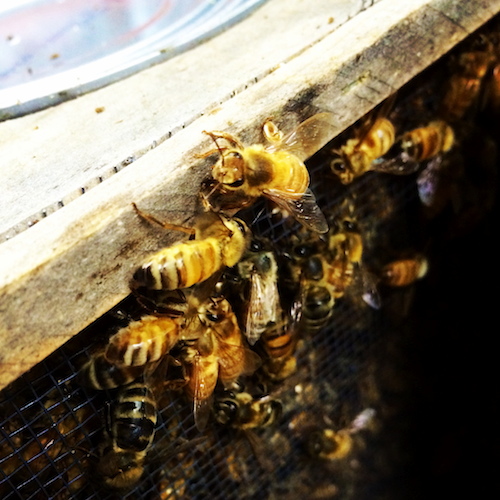If I see one more post on Facebook about having to stop the use of pesticides to save the honeybees—and save the world—I think I will scream.
It isn’t just the pesticides, fungicides and herbicides on the farmers’ fields killing bees.
The beekeepers are also largely to blame.
Yes, I know honeybees are dying at a rapid pace. Yes, I know pesticides and herbicides and all sorts of things are contributing to this. And yes, I know, honeybees do help with pollination. This all is true.
Honeybees are dying at alarming rates, but it isn’t just from the chemicals they are picking up in the fields. It is also the result of the factory farming/monoculture beekeeping practices—called “modern” beekeeping—we see in use today.
What if all the honeybees died in the United States? What then?
Did you know that in the United States honeybees aren’t even a native species? Hmmm…how were plants pollinated here before honeybees arrived?
That role would be would have been filled by our native pollinators.
World wide, there are over 200,000 different species of animals that act as pollinators. Having the honey bees vanish permanently wouldn’t mean the end of pollination, but would possibly be the end of some very poor agricultural practices in use already.
Here are some facts you may not know about modern beekeeping and some solutions:
1. Most honeybees are, essentially, factory-farmed insects.
They are raised in boxes that are filled with recycled “foundation” comb—comb that is factory-made using wax cappings from other bee colonies.
To the modern beekeeper, this means the bees have less energy “wasted” on creating wax and more energy goes into honey production. Bees aren’t allowed to build their own homes anymore, and this is truly a part of their life-cycle. Worse still, the foundation comb provided for the bees is loaded with toxins, as it is a mix of wax from many different hives raised in a multitude of ways.
Bees can be raised in different hive systems, such as the top bar hives I use. These systems seem to support the natural life-cycle of the honeybees better, allowing them to make their own comb.
2. Bees are unnaturally shipped around the country in semi trucks.
Bees, in their boxes, are shipped thousands of miles across the country just to pollinate large agri-businesses, such as, the almond groves in California.
These groves are incredibly artificial environments where tons of chemicals are dumped on the ground just to prevent grass from growing. Most importantly, bees have a very delicate immune system, and truly need to settle into one geographical region to build their colony in communion with the immediate environment. Bottom line: bees aren’t meant to be moved around the country in trucks—it ruins their vitality.
Eat locally. Eat organically. Don’t buy food, such as nuts and apples, raised by trucked bees. Don’t buy honey from beekeepers that do this to their bees…in fact, only buy local honey.
3. Bees are routinely medicated by the beekeepers.
Antibiotics and other chemical treatments are frequently used in hives to “prevent” and “treat” diseases and infestations. Most times bees are more susceptible to the things they are being treated for, such as varroa mites, because of how they have been raised. We are weakening the bees by exposing them to these chemicals right in their own homes.
Beekeepers must start using natural methods for raising their bees. We can’t medicate our bees in this way and then complain about the chemicals the farmers are using in raising our food. We can’t expect healthy bees from such practices, and we can’t expect them, with a weakened system, to be able to withstand the toxins in the world around them.
4. Honeybees have a junk food diet.
Yes, that is right. Beekeepers routinely take too much honey off of the hives for profit in the fall and then feed their bees sugar water and corn syrup instead.
There is no excuse for this, except for a few very rare (emergency) exceptions. I still have always managed to feed them honey I have from the previous years, bought honey if I was out or fed maple sap in the early spring, which they love. Corn syrup and sugar weaken the bees. Imagine how healthy we would be if we ate this all day long.
5. Honeybees aren’t allowed to make their own queens, nor are they allowed to swarm.
Both of these are a part of their natural life-cycle. Bees in a colony grow a new queen when they think they should and the old queen moves on with part of the colony, leaving the new queen and part of the workers behind.
In modern beekeeping practices, queen cells are actively sought out and destroyed by beekeepers in order to prevent a swarming of the bees. If they don’t swarm, the colony stays larger and the beekeeper can steal more honey. An illogical exception to this is when the beekeeper for some reason decides he wants to replace a queen. When this happens, the beekeeper usually buys a replacement from an outside source or sometimes deliberately raises one. The purchased ones are raised in a “lab” situation and usually come artificially inseminated.
If one is diligent, one can often prevent swarming by adding on more frames for bees to work on or splitting the hive (which is a good way to increase your number of bee colonies). Honestly, I just let my bees do what they wish. If they feel it is time to raise a new queen, then I don’t fight them…I trust in their knowledge of what they need. If they want to swarm, I let them. Sometimes I am able to catch the swarm and start a new hive, sometimes nature gets the blessing of a wild colony. This seems the healthier for the colony, long-term, than killing all the queen cells as they are built.
How do I know these things? I have been kept by bees for 15 years, and worked as an apprentice beekeeper for two years before I started. I have read books, attended some meetings, but mostly developed my own ideas through contemplation and observation—ideas that natural beekeepers and scientists around the world are now (loudly) supporting.
A honey thief at times, I mostly love to let the honeybees be, listening and noticing. I have neglected my bees seriously some years, lavished attention on them during others. Unlike many beekeepers, while getting some honey is a benefit, that isn’t my main reason to have bees. I really think it more important to view my role as a steward of the bees. I am here to help facilitate a natural life for bees.
I would say that after 17 years at this I am still a complete amateur, compared to most. Yet even with my amateur status, I know that proper honeybee rearing starts at home and with how the bees are kept by us. We need to get our own beekeeping practices in order first. Only then can we truly assess the damage being done by the farming practices around us.
Love elephant and want to go steady?
Sign up for our (curated) daily and weekly newsletters!
Editor: Travis May
Photo: Courtesy of Author











Read 7 comments and reply